

Grammar


Tenses


Present

Present Simple

Present Continuous

Present Perfect

Present Perfect Continuous


Past

Past Simple

Past Continuous

Past Perfect

Past Perfect Continuous


Future

Future Simple

Future Continuous

Future Perfect

Future Perfect Continuous


Parts Of Speech


Nouns

Countable and uncountable nouns

Verbal nouns

Singular and Plural nouns

Proper nouns

Nouns gender

Nouns definition

Concrete nouns

Abstract nouns

Common nouns

Collective nouns

Definition Of Nouns

Animate and Inanimate nouns

Nouns


Verbs

Stative and dynamic verbs

Finite and nonfinite verbs

To be verbs

Transitive and intransitive verbs

Auxiliary verbs

Modal verbs

Regular and irregular verbs

Action verbs

Verbs


Adverbs

Relative adverbs

Interrogative adverbs

Adverbs of time

Adverbs of place

Adverbs of reason

Adverbs of quantity

Adverbs of manner

Adverbs of frequency

Adverbs of affirmation

Adverbs


Adjectives

Quantitative adjective

Proper adjective

Possessive adjective

Numeral adjective

Interrogative adjective

Distributive adjective

Descriptive adjective

Demonstrative adjective


Pronouns

Subject pronoun

Relative pronoun

Reflexive pronoun

Reciprocal pronoun

Possessive pronoun

Personal pronoun

Interrogative pronoun

Indefinite pronoun

Emphatic pronoun

Distributive pronoun

Demonstrative pronoun

Pronouns


Pre Position


Preposition by function

Time preposition

Reason preposition

Possession preposition

Place preposition

Phrases preposition

Origin preposition

Measure preposition

Direction preposition

Contrast preposition

Agent preposition


Preposition by construction

Simple preposition

Phrase preposition

Double preposition

Compound preposition

prepositions


Conjunctions

Subordinating conjunction

Correlative conjunction

Coordinating conjunction

Conjunctive adverbs

conjunctions


Interjections

Express calling interjection

Phrases

Sentences


Grammar Rules

Passive and Active

Preference

Requests and offers

wishes

Be used to

Some and any

Could have done

Describing people

Giving advices

Possession

Comparative and superlative

Giving Reason

Making Suggestions

Apologizing

Forming questions

Since and for

Directions

Obligation

Adverbials

invitation

Articles

Imaginary condition

Zero conditional

First conditional

Second conditional

Third conditional

Reported speech

Demonstratives

Determiners


Linguistics

Phonetics

Phonology

Linguistics fields

Syntax

Morphology

Semantics

pragmatics

History

Writing

Grammar

Phonetics and Phonology

Semiotics


Reading Comprehension

Elementary

Intermediate

Advanced


Teaching Methods

Teaching Strategies

Assessment
ADVERBS Identifying adverbs
المؤلف:
EVELYNP.ALTENBERG & ROBERTM.VAGO
المصدر:
English Grammar Understanding the basics
الجزء والصفحة:
P103-C8
2025-11-07
181
ADVERBS
Identifying adverbs
We’ve saved adverbs for last because they can be a bit tricky. Adverbs do lots of different things and can be in lots of different places in a sentence. In fact, the chances are, if you don’t know what else a word is, it’s probably an adverb.
The adverbs are underlined in the sentences below:
1. I live here. (information about location)
2.My brother is arriving today. (information about time)
3. She dances gracefully. (information about manner)
4.That child is very sweet. (degree information about an adjective, in this case, about sweet)
5. She works extremely efficiently. (degree information about another adverb, in this case, about efficiently)
Quick tip
Adverbs generally indicate information about location, time, degree, and manner. They provide extra information about the action in a sentence, about adjectives and about other adverbs.
Quick tip
If you don’t know what else a word is (and you’ve eliminated the other parts of speech), it’s probably an adverb.
While unfortunately, we can’t give you a simple rule that will help you identify adverbs 100 percent of the time, the tips below will help you correctly identify adverbs in many cases.
Quick tip
Can the word go in the followings lot? Mary slept ______. If so, it’s probably an adverb. For example, Mary slept peacefully. Peacefully is an adverb.
Quick tip
Can the word go in the following slot?, I gave/will give my speech. If so, it’s probably an adverb. For example, Yesterday, I gave my speech. Yesterday is an adverb. Or: Tomorrow, I will give my speech. Tomorrow is an adverb
Quick tip
Can the word go in the following slot? He is ______ happy. If so, it’s probably an adverb. For example, He is very happy. Very is an adverb.
Quick tip
Does the word end in the suffix -ly? Is it an adjective? If it ends in -ly and it’s not an adjective, it’s probably an adverb (e.g. hopefully, happily, unusually).
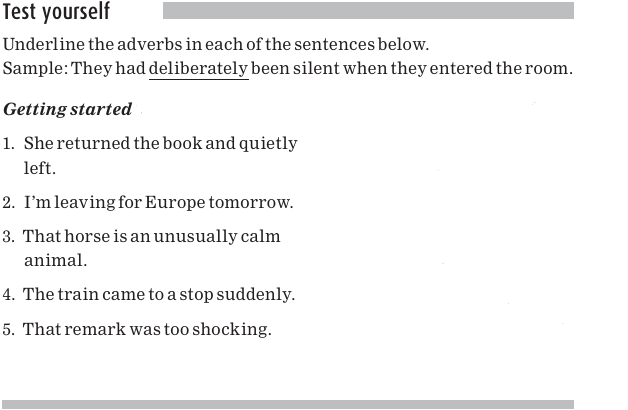
Answers

Many, though not all, adverbs end in-ly (rapidly, innocently, sweetly, etc.). However, some adjectives also end in-ly, for example lovely, friendly. It’s easy to distinguish them. Just remember that the adjectives can go in the slot the _____ boy: the lovely boy, the friendly boy.
While adverbs can go before the adjective, for example the extremely friendly boy (extremely is an adverb), adverbs cannot occupy the slot directly before the noun. That is, one cannot say, *the extremely boy or *the innocently boy, so extremely and innocently are not adjectives; they must be adverbs.
Note that some nouns, for example the flower lily, end in-ly as well. And just to add a little more spice to the recipe, there are some words that can be used either as adverbs or as adjectives:
6a. That is a pretty easy book. (Pretty is similar to the word very here, and is an adverb of degree.)
6b. That is a pretty child. (Pretty is an adjective.)
7a. You drive too fast. (Fast tells us more about the verb drive, so it is an adverb.)
7b. This actor’s delivery was too fast. (Fast tells us more about the noun delivery, so it is an adjective.)
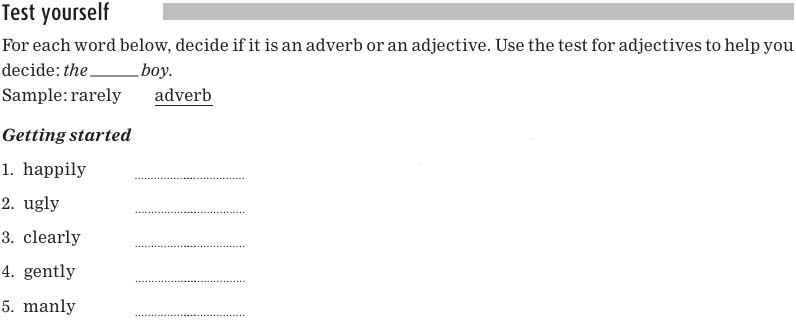
Answers
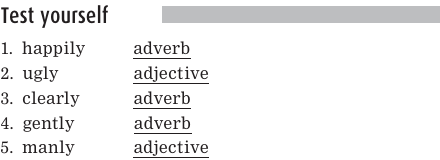
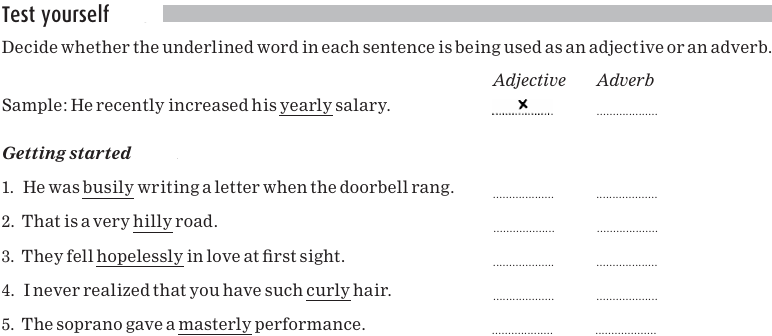
Answers


Answers

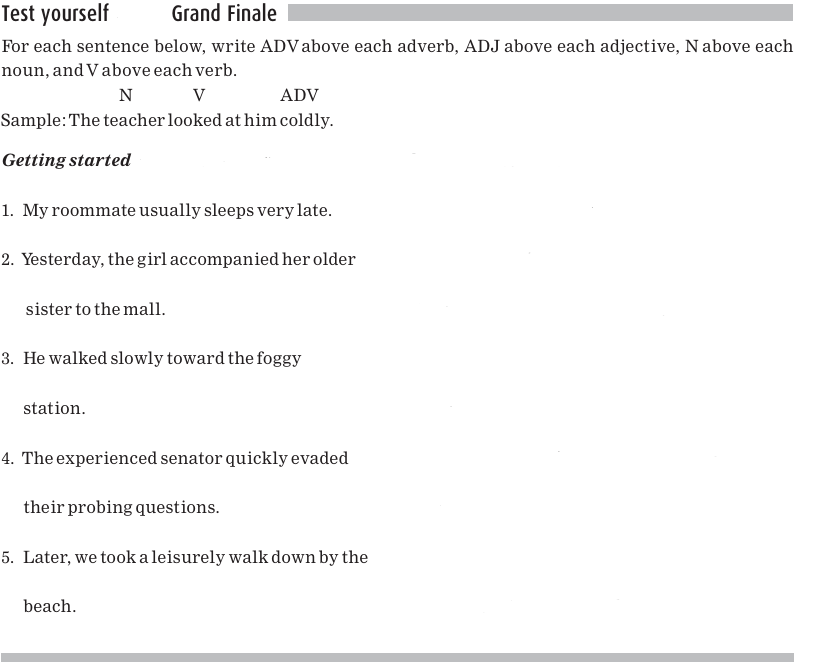
Answers
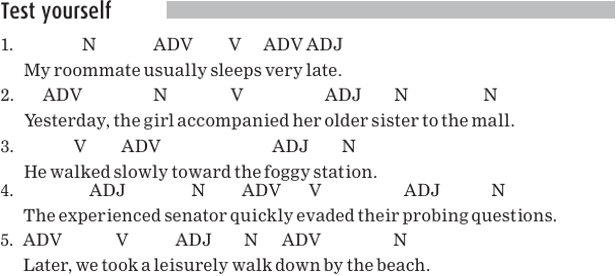
 الاكثر قراءة في Adverbs
الاكثر قراءة في Adverbs
 اخر الاخبار
اخر الاخبار
اخبار العتبة العباسية المقدسة

الآخبار الصحية















 قسم الشؤون الفكرية يصدر كتاباً يوثق تاريخ السدانة في العتبة العباسية المقدسة
قسم الشؤون الفكرية يصدر كتاباً يوثق تاريخ السدانة في العتبة العباسية المقدسة "المهمة".. إصدار قصصي يوثّق القصص الفائزة في مسابقة فتوى الدفاع المقدسة للقصة القصيرة
"المهمة".. إصدار قصصي يوثّق القصص الفائزة في مسابقة فتوى الدفاع المقدسة للقصة القصيرة (نوافذ).. إصدار أدبي يوثق القصص الفائزة في مسابقة الإمام العسكري (عليه السلام)
(نوافذ).. إصدار أدبي يوثق القصص الفائزة في مسابقة الإمام العسكري (عليه السلام)


















